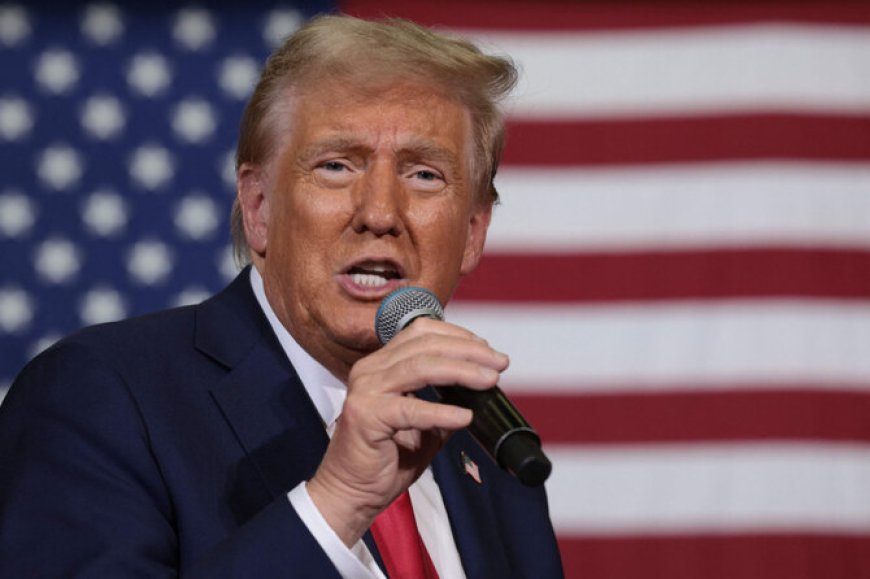Opinion: Trump's Critics of Biden's Foreign Policy Ignores the Whole Picture

Former U.S. President Donald Trump used a recent interview with Al-Arabiya to assign blame for the Middle East's current crises—especially the Israel-Hamas war—as well as the continuing Russia-Ukraine crisis on President Joe Biden. Trump said that none of these tragedies would have happened had he still been in office. Although politically beneficial for Trump, this assertion ignores the complexity of these issues and the layered politics that preceded the Biden presidency.
During the conversation, Trump's main point of contention was his claim that under his direction the October 7 Hamas attack on Israel never would have happened. He cited the success of his government in negotiating the Abraham Accords, which resulted in diplomatic ties between Israel and many Arab countries, notably Bahrain and the United Arab Emirates, being normalized.
Unquestionably a major diplomatic victory during Trump's presidency, the Abraham Accords changed Middle Eastern politics. Considered as a milestone, these accords promoted cooperation between Israel and important Arab governments. Though the accords opened fresh diplomatic routes, they did not solve the fundamental issues driving conflict between Israel and the Palestinian territories. Gaza stayed a difficult problem under blockade and experiencing extreme economic difficulty. Trump's presentation of the Accords as the cure-all for regional peace ignores these more underlying problems.
Furthermore complicating the story are recent events in the area. Responding to Israel's military operations in Gaza, Bahrain's parliament decided in October 2023 to cut economic connections to Israel. This action shows that the agreements reached on normalizing under Trump's presidency are not exempt from the influence of revived hostilities.
The Rising Violence Escalation in Gaza and Israel
Trump's comments coincide with Israel's military actions outside of Gaza, hitting targets in Lebanon in its fight with the Iran-backed force Hezbollah. Trump has charged Biden with not moderating the forceful military reaction of Israeli Prime Minister Benjamin Netanyahu to Hamas, which has resulted in hundreds of civilian casualties in Gaza. Particularly among progressive Democrats and Muslim-American voters, this aggressive attack has sent off indignation worldwide and generated a great divide inside Biden's own party.
Trump is right in noting the differences among American voters, especially with regard to the candidacy of Vice President Kamala Harris on the line in 2024, but his assertion that he could quickly terminate the battle "one way or another" seems overs simplistic. Trump's proposal dismisses the intricate network of alliances, conflicts, and historical grievances still driving bloodshed in the area. Furthermore, regardless of party, every U.S. president must balance American strategic goals with global humanitarian issues.
The Conflict Between Russia and Ukraine
Claiming that his foreign policy stance empowered Russia, Trump also turned responsibility for the Russia-Ukraine conflict on Biden. This comment fits a larger story that Republicans have developed, contending that Biden's leaving Afghanistan signified weakness on the world scene.
But long-standing geopolitical aspirations of Russian President Vladimir Putin lead Russia to invade Ukraine in February 2022. Years of fermenting were Russia's need to restore control over former Soviet territory combined with Ukraine's increasing tilt toward NATO. Although Biden's crisis management has been far from flawless, it is unlikely that the invasion can be completely ascribed to the current government. Trump's criticism is further complicated by his own friendly relationship with Putin during his presidency, which drew much criticism for its laxity.
What Trump Ignues?
Trump's interview captures a larger pattern in American politics: both sides usually blame the other for overseas crises without appreciating the nuanced, usually bipartisan character of foreign policy. For decades, the Middle East has been a stage of strife; regardless of who sits in the Oval Office, American engagement has often been rife with mistakes.
Although Trump can highlight the diplomatic triumph of the Abraham Accords, the peace they promised has not materialized in the manner many had hoped for. Particularly the continuous occupation, the siege of Gaza, and Jerusalem's status, the accords did not really address the underlying reasons of the Israeli-Palestinian conflict. It is abundantly evident that diplomatic successes, while important, cannot heal long-standing resentment if violence erupts once more.
Regarding the Russia-Ukraine crisis, Trump leaves open a vague road ahead. Isolationist policies defined his foreign policy during his presidency; it is unclear how his return to the White House would present a more successful plan than Biden's present one of backing Ukraine via military aid and sanctions on Russia.
The Course Ahead
The problems confronting Europe and the Middle East today are the result of a convergence of elements many of which cut across any one government. Although some voters may find resonance in Trump's criticism of Biden, it simplifies the complex reality of foreign affairs. Should Trump take office, he will confront the same unworkable issues—conflicts not resolved by a change in leadership by itself.
Particularly in areas as unstable as the Middle East, foreign policy calls for consistent diplomacy, strategic patience, and an awareness of historical as well as modern forces. Although Trump's interview might have set the foundation for his 2024 presidential campaign, his comments provide little in terms of meaningful answers for the crises now wreaking havoc all around.













































